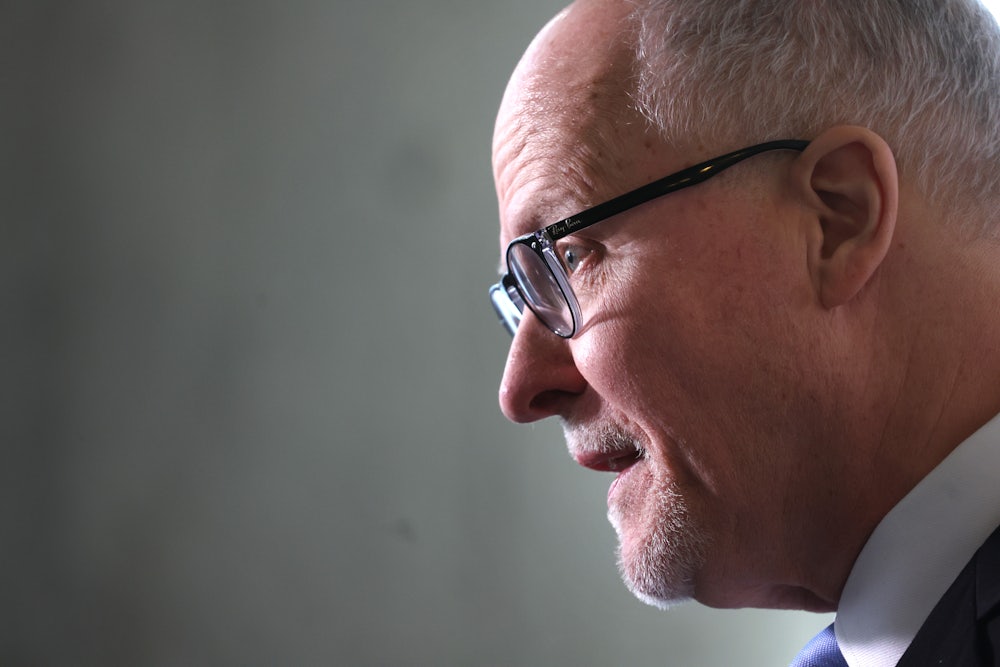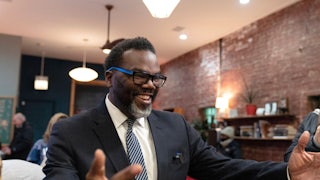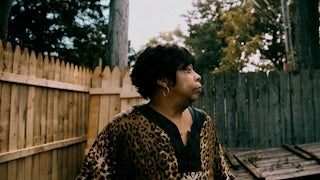Paul Vallas is not your typical Democratic candidate for mayor—not anywhere in the country, but certainly not in Chicago. He once spoke at a fundraiser for Awake Illinois, an anti-LGBTQ group that called Illinois Governor J.B. Pritzker a “groomer” and incited harassment against a suburban bakery for planning a family-friendly drag brunch. He’s been endorsed by Chicago’s Fraternal Order of Police, which recently hosted Florida Governor Ron DeSantis for an event and whose Trump-supporting president has defended the January 6 insurrection. Vallas has defended his son, Gus Vallas, a white police officer in San Antonio, for fatally shooting a 28-year-old Black man during a foot chase. And it’s not clear if he even lives within Chicago city limits.
You might say Vallas is “more of a Republican than a Democrat”; he himself said so back in 2009. And yet he’s the clear front-runner for the city’s nonpartisan mayoral election on Tuesday: The latest poll shows him leading with as much as 32 percent of the vote, all but guaranteeing that he’ll be one of the two candidates chosen for April’s runoff election (no candidate is close to the 50 percent needed to win outright on Tuesday). This is surprising not only because Vallas is the one of the most conservative candidates in the field but because his record is strewn with failed bids for office—the last time being his 2019 mayoral run, when he managed just 5 percent of the vote.
What’s changed since then? The current field of candidates is certainly more favorable to Vallas than it was the last time around. But a lot has changed too, in both Chicago politics and among Democrats nationally, especially on the fraught issue at the heart of this election: urban crime.
Vallas made his name as a public schools steward, first as the CEO of Chicago’s schools from 1995 to 2001 and later in Philadelphia and post-Katrina New Orleans. He was praised for increasing test scores and creating after-school programs, and criticized for accelerating district inequities through charter schools, undermining unionized workforces through outsourcing, and mishandling budgets. “Paul’s never seen a dollar that he wasn’t willing to spend three times,” former Philadelphia Mayor Michael Nutter told the Chicago Tribune.
Vallas’s first bid for office came in 2002, when he very narrowly lost the Democratic primary for governor of Illinois to Rod Blagojevich. In 2014, he tried one step down, as Governor Pat Quinn’s running mate, but they lost to Republican businessman Bruce Rauner. In 2019, Vallas set his sights on Chicago instead. In the race to replace retiring Mayor Rahm Emanuel, Vallas ran as a problem solver and budget balancer; his schtick was carrying a broom to every press conference and promising to “sweep out” City Hall.
Instead, former federal prosecutor Lori Lightfoot swept into City Hall, winning all 50 wards in the runoff on a platform that explicitly rejected the machine-style insider politics that had long dominated Chicago (most famously through the Daley family). But backlash from the left and the right—from her eternal war with the Chicago Teachers Union and mishandling of a wrongful police raid to claims that she is neglecting the police force and allowing corporations to leave Chicago—has left Lightfoot, the first Black woman and openly gay person to become the city’s mayor, with few allies and an uphill battle for reelection. Her approval rating has dropped to 22 percent, and recent polls suggest she might not earn enough votes to make the runoff.
Crime has dominated the conversation this election cycle. Homicides trended upward in 2020 and 2021—among the highest seen since the 1990s—and carjackings surged around the same time, though the rates of both fell in 2022. (While gun violence is a real problem in Chicago, the city’s national reputation as the “murder capital” of the United States is overblown.) Meanwhile, the city budget for police has bloated. The city earmarked $1.9 billion for police in 2023—one of the highest police budgets per capita of any city—while the homicide clearance rate hovers at around the national average of 50 percent. Save for teachers union activist Brandon Johnson, who is more focused on bolstering the social safety net, the other top contenders—Vallas, Lightfoot, and Congressman Jesús “Chuy” García—are pushing for more police and a crackdown on crime.
But Vallas stands alone in his fidelity to a “Back the Blue” style of governance. Endorsed by the Chicago police union, he has leaned into expanding the police state as the solution to ending violence. He proposes hiring nearly 1,200 police officers (which amounts to 10 percent of the current total), replacing the Chicago Transit Authority’s private, unarmed security with cops, and replacing the current police superintendent. The hyperfocus on public safety has also led to accusations of racist dog-whistling—for instance, when he told a crowd this month he was “taking back our city.” Over the past week, he has taken heat for “liking” racist and offensive tweets (he apologized and blamed it on an unknown campaign volunteer, then said a day later that he was hacked, even though some of the tweets predate his campaign) and for charging in a 2021 interview that “critical race theory” was “dangerous” and undermining white families.
Nonetheless, he has gained a new sheen of respectability. His endorsement by the Chicago Tribune calls him “unapologetically wonkish” with “detailed plans and fresh ideas” and “nationally recognized expertise in city financing, policing and public education.”
In substance, Vallas is the same candidate as he was four years ago, running on his reputation as a policy wonk and a champion of police. In a typical line from a televised debate last month, he said, “Chicago’s in a leadership crisis. Every problem we’re experiencing, from the escalating crime to the individuals leaving our school system in record numbers to the fact that we’re now the highest-taxed city among big cities in the country, is a product of bad decisions from the Fifth Floor [where the Mayor’s office is in City Hall].” What has changed is Vallas’s operation of a more sophisticated, disciplined campaign; an easier set of challengers (in 2019, he was one of many white male politicians vying for the law-and-order vote, and this time, he is the only white candidate and the only conservative Democrat polling well); and a political environment where “defunding the police” has become a convenient bogeyman for Democrats.
Chicago—and Illinois in general—has not been a stranger to the nationwide backlash against progressive criminal justice policies. In 2020, progressive prosecutor Kim Foxx successfully defended herself against three challengers in the most expensive Cook County state’s attorney race in history, evading the eventual fate of San Francisco District Attorney Chesa Boudin, who was recalled from office due to a tough-on-crime backlash. In 2022, Governor Pritzker was the subject of a conservative misinformation campaign after he signed a historic criminal justice reform bill that, among many things, made Illinois the first state to abolish cash bail. The right called it the “Purge Law,” claiming that jails would be emptied out in a chaotic free-for-all.
Though Vallas is polling in first place, making him widely expected to reach the runoff after Tuesday’s election, the liberal and progressive votes are being split among a number of candidates; it’s not clear that he can break 50 percent in a two-way race. Nonetheless, Vallas stands a real chance of becoming mayor. It would be a shocking shift to the right for Chicago: a consequence of an unpopular incumbent, fearmongering over crime, and, perhaps, a populace eager to return to the “normalcy” of a white male mayor beholden to police and corporate interests—even if, this time around, he’s not the head of a political machine but a Democrat in name only.






